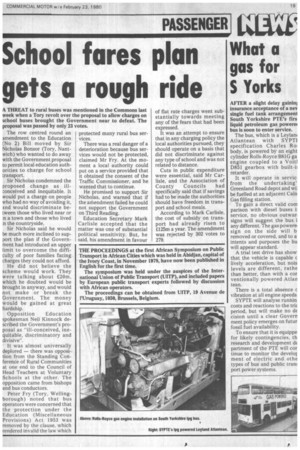School fares plan gets a rough ride
Page 21

If you've noticed an error in this article please click here to report it so we can fix it.
A THREAT to rural buses was mentioned in the Commons last week when a Tory revolt over the proposal to allow charges on school buses brought the Government near to defeat. The proposal was passed by only 23 votes.
The row centred round an amendment to the Education (No 2) Bill moved by Sir Nicholas Bonsor (Tory, Nantwich) who wanted to do away with the Government proposal to permit local education authorities to charge for school transport.
Sir Nicholas condemned the proposed change as illconceived and inequitable. It would put a charge on people who had no way of avoiding it, and would discriminate between those who lived near or n a town and those who lived n the countryside.
Sir Nicholas said he would be much more inclined to support the plan if the Government had introduced an upper limit to overcome the difficulty of poor families facing charges they could not afford.
He did not believe the scheme would work. They were talking about £20m, which he doubted would be brought in anyway, and would not make or break the Government. The money would be gained at great hardship.
Opposition Education spokesman Neil Kin nock described the Government's proposal as -ill-conceived, inequitable, discriminatory and divisive".
It was almost universally deplored — there was opposition from the Standing Conference of Rural Communities at one end to the Council of Head Teachers at Voluntary Schools at the other. The opposition came from bishops and bus conductors.
Peter Fry (Tory, Wellingborough) noted that bus operators were concerned that the protection under the Education (Miscellaneous Provisions) Act 1953 was removed by the clause, which rendered invalid the law which protected many rural bus services.
There was a real danger of a deterioration because bus services would not be protected, claimed Mr Fry. At the moment a local authority could put on a service provided that it obtained the consent of the Traffic Commissioner, and he wanted that to continue.
He promised to support Sir Nicholas, and warned that if the amendment failed he could not support the Government on Third Reading.
Education Secretary Mark Carlisle accepted that the matter was one of substantial political sensitivity. But, he said, his amendment in favour of flat rate charges went substantially towards meeting any of the fears that had been expressed.
It was an attempt to ensure that in any charging policy the local authorities pursued, they should operate on a basis that did not discriminate against any type of school and was not related to distance.
Cuts in public expenditure were essential, said Mr Carlisle, and the Association of County Councils had specifically said that if savings had to be'made the authorities should have freedom in transport and school meals.
According to Mark Carlisle, the cost of subsidy on transport had already risen to £125m a year. The amendment was rejected by 302 votes to 279.




































































































































